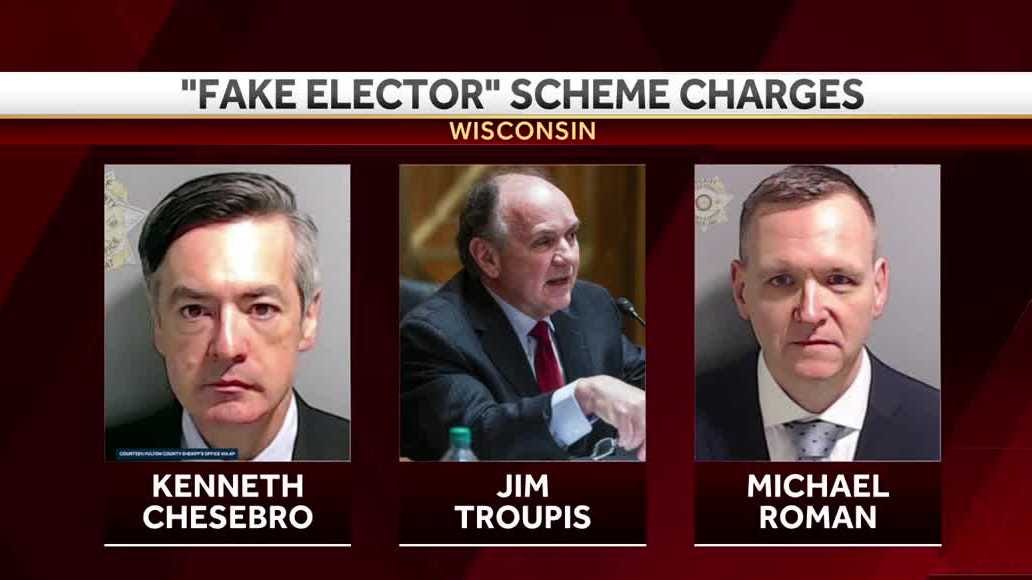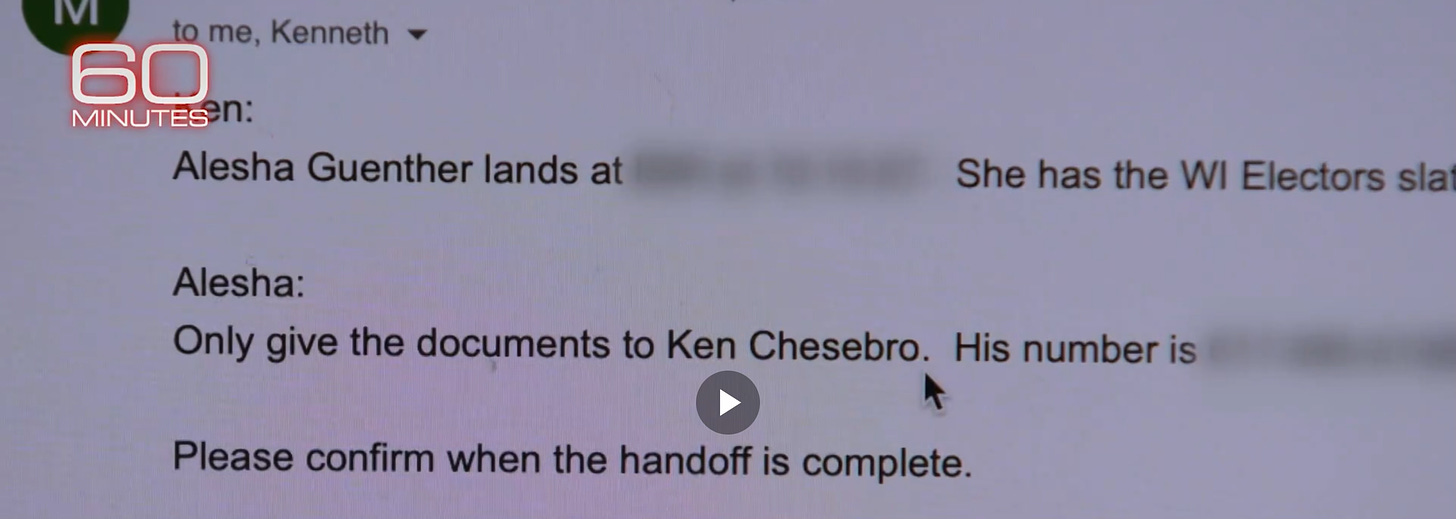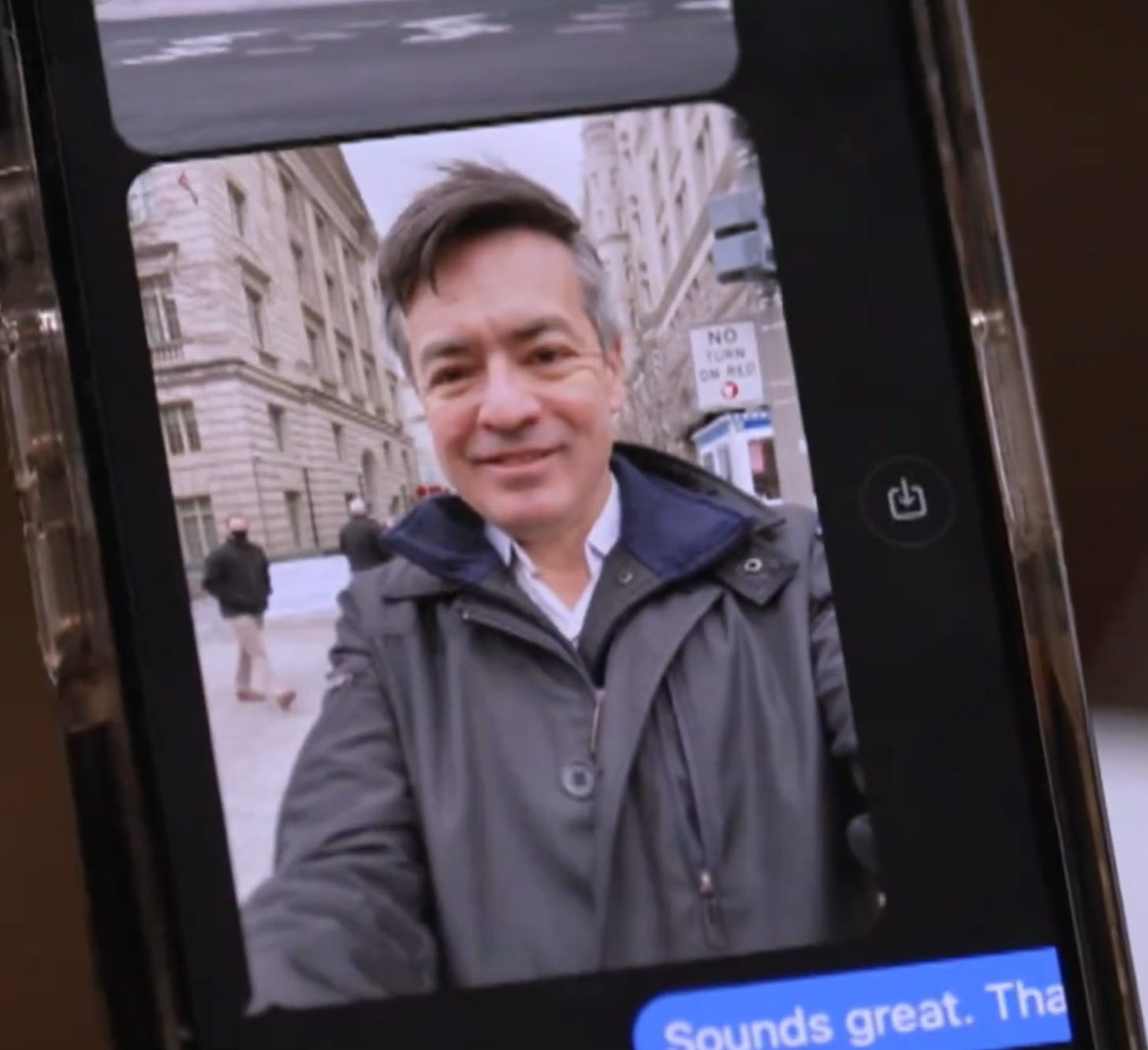The Cheese’s Story Has Some Holes
How a lie became an indictment, and an indictment could ensnare a U.S. senator.
Something about Kenneth “The Cheese” Chesebro’s story really stunk. And the Wisconsin Attorney General didn’t buy it. Now, the pool of criminality may grow quite wider, and it could even engulf a sitting U.S. senator, Ron Johnson of Wisconsin.
On Tuesday, the Wisconsin AG indicted three Trump allies for the fake elector scheme during the 2020 election. Chesebro was named along with a former state judge, Jim Troupis, and Trump’s Director of Election Day Operations, Mike Roman.
Chesebro had been on a metaphorical bus tour around the country, busily throwing other defendants under it. He was an early cooperator with authorities in Georgia, Michigan, Arizona and Nevada, where he had helped organize similar fake elector schemes.
There are now dozens of defendants in those states, but since Georgia, Chesebro has not been among them. Sweet deal, right?
There was just one problem. The story he’d told state investigators was a lie.
Today, I’ll review the curious story of Chesebro’s deceptions and how they have led to his indictment in Wisconsin instead of a cooperation deal. Then we’ll pull on a few more threads of this Chese-cloth and see where they might lead. Importantly, they seem to point toward once again to Sen. Johnson and his possible involvement in the conspiracy to overturn the election.
Buckle up, this is quite the story.
The Stupid Coup
Back in February I wrote a piece called “The Stupid Coup” about Kenneth Chesebro, widely considered the architect of the fake elector scheme. In it, I explained why, for a brilliant lawyer who once was the research assistant for Professor Laurence Tribe at Harvard, Chesebro was pretty damn dumb. I explained,
If you’re going to plot to overturn an election, it’s best not to leave much of a trail. But that’s exactly what attorney and architect of the fake elector scheme, Kenneth “The Cheese” Chesebro, did.
That trail wasn’t just in emails, texts and memos exchanged with his co-conspirators John Eastman and Boris Epshteyn, as we’ve already seen. It was also in a secret Twitter account called “BadgerPundit.”
Pro-tip: Maybe if you’re a coup-plotting attorney from Wisconsin, you shouldn’t use the red and white colors of the University of Wisconsin Badgers in your Twitter alias….
And maybe you shouldn’t outright LIE to Michigan prosecutors and say you had no alternate IDs for social media.
And maybe, just maybe, you shouldn’t use BadgerPundit to lay out your real plan to disrupt the electoral count and send it back to the states, where false election fraud claims would sow chaos, to be resolved by a GOP-friendly Supreme Court.
Chesebro had asserted to investigators that the fake elector plan was just a contingency in case Trump won in court, and that state legislators would have had no power to override the courts. But that’s not at all what BadgerPundit tweeted, nor what Chesebro told his co-conspirators in private.
Chesebro, as BadgerPundit, asserted that the court battles didn’t matter, and that the GOP legislatures could choose the electors and throw the race to Trump. The day after the 2020 election was called for Joe Biden by most media outlets, Chesebro, as BadgerPundit, tweeted a reply to someone who correctly observed that all the court battles were just another way for Trump to grift from his followers. An outraged BadgerPundit responded,
You don’t get the big picture. Trump doesn’t have to get courts to declare him the winner of the vote. He just needs to convince Republican legislatures that the election was systematically rigged, but it’s impossible to run it again, so they should appoint electors instead.
Either Chesebro would need to show he had a multiple personality disorder, or this is indicative of what he really thought.
I’m going with the latter, in part because of what he also communicated to his co-defendants. Per reporting by the Milwaukee Journal Sentinel, on November 18, 2020, Chesebro sent a memo to Troupis that outlined his scheme. Thanks for the great summary, Cheese!
In the memo, Chesebro laid out why the “true” deadline for the election was not the safe harbor day of December 8 under the Electoral Count Act, nor even the day the Electoral College would meet on December 14. He claimed,
Assuming the electors pledged to Trump and Pence end up meeting at the Wisconsin Capitol on December 14 to cast their votes, and then send their votes to the President of the Senate in time to be opened on January 6, a court decision (or, perhaps, a state legislative determination) rendered after December 14 in favor of the Trump-Pence slate of electors should be considered timely.
Wait, electors “pledged to Trump and Pence?” That means the fake electors. And what is this about a “state legislative determination” after the Electoral College vote “in favor of” those fake electors? I thought Chesebro had insisted to investigators that his plan didn’t allow for state legislatures to override the courts.
I guess that was a lie.
Then there was a December 8, 2020 email between Chesebro and Troupis. “Court challenges pending on Jan. 6 really not necessary,” Chesebro proclaimed. To which Jim Troupis replied, “This is an excellent summary of the end game. Thank you.”
No, really, thank you, Jim. Very helpful.
Fun footnote time: In the Wisconsin indictment, as legal reporter Lisa Rubin heroically sleuthed out, the AG takes specific note of Chesebro’s false statements to Wisconsin prosecutors and of the existence of the BadgerPundit account linked back to him, after he denied to authorities that he had sent messages through Twitter. It seems Chesebro lied to both Michigan and Wisconsin authorities.
As I predicted back in February, the broad deception that Chesebro got himself caught in would come back to haunt him, and on Tuesday it did. Chesebro is now once again an indicted criminal defendant, accused of forgery for the Wisconsin fake elector certificate and facing up to six years in prison.
The intern and the drop, during “not a safe time”
Back in February, 60 Minutes recently interviewed two individuals with first-hand knowledge of Wisconsin fake electors scheme: Alesha Guenther, a 23-year old law school student working part-time in 2020 for Wisconsin’s GOP, and Andrew Hitt, the Republican Party chair at the time, who was one of the signatories on the fake elector certificate. It’s worth revisiting what they told Anderson Cooper about the Wisconsin fake elector scheme.
First, Guenther’s account.
In her interview, Guenther relayed that she had been working during her break from classes in early 2021 when, on January 4th, she received a call from the Executive Director of the Republican Party of Wisconsin. The Director asked if she could fly some papers out to D.C. in person because the originals had gotten lost in the mail. That’s objectively an odd request, but she agreed to go. She picked up the fake elector papers from the Party’s headquarters on January 5, 2021, then flew with them out to Washington, D.C.
Mike Roman, a co-defendant in the Wisconsin indictment, emailed Guenther and Chesebro to set up the handoff of the fake papers. Here’s a screenshot of it:
Guenther thought the email was “odd” and “dramatic.” She knew that the Electoral Count was set for January 6, but believed, understandably, that for the documents she was delivering to actually be used, a court of law would have had to rule in their favor.
But that’s not at all what Roman and Chesebro believed. In texts dated December 12, 2020, Chesebro and Roman exchanged messages about the language in the false elector certificates, with Roman writing, “F*ck these guys.” And on December 16, 2020, two days after the Electoral College had met and voted, Chesebro messaged Roman to acknowledge that “things might have been different if we’d won Wisconsin” and suggesting that the Trump campaign should “weaponize the Electoral Count Act” to put Biden “in a no-win situation.”
Guenter had been sent to D.C. unwittingly to do just that. She had never met Chesebro, but he sent her a selfie of what he looked like.
Per Wisconsin indictment, Guenter sent a text message on January 5 saying “5 mins until I make the drop” and added, “I feel like a drug dealer.”
When the handoff occurred, as she told 60 Minutes, Chesebro took “a dramatic step back and looked at me and said, ‘You might have just made history.’”
Now, Andrew Hitt’s account.
Hitt also spoke with Anderson Cooper on 60 Minutes. According to that segment,
Hitt was one of 10 republicans nominated to be an elector if Trump won in Wisconsin. On Dec. 4, he says, he was advised by the state GOP's outside legal counsel to gather the other Republican electors on Dec. 14 at the Capitol and as a contingency, sign a document claiming Trump won the state in case a court overturned the election in Wisconsin.
That morning of the 14th, the Wisconsin Supreme Court narrowly ruled against the Trump Campaign 4-3 and refused to throw out the votes of heavily minority Dane and Milwaukee Counties, as the GOP had requested. But the fake electors were told to gather anyway and sign the certificate, Hitt said, in case the U.S. Supreme Court overruled the Wisconsin Supreme Court on the matter.
Kenneth Chesebro showed up to watch the signing of the certificate.
Hitt insisted that he was frightened of the consequences of not agreeing to sign the certificate. If the High Court ruled their way but there was no “alternate” set of electors appointed in time, he feared he would be blamed for Trump losing the state of Wisconsin on that technicality, and he believed it would put him and his family in danger.
“It was not a safe time. If my lawyer is right, and the whole reason Trump loses Wisconsin is because of me, I would be scared to death,” he said to Cooper.
Hitt and the other electors settled a lawsuit brought against them by some of the state’s Democratic electors in which they admitted that they’d signed a document that was “used as part of an attempt to improperly overturn the 2020 presidential election results.” Hitt cooperated with the January 6 Committee and federal prosecutors, and he may be cooperating with state authorities.
Sen. Ron Johnson is having a bad week
There’s a big unanswered question around January 6 and the quest to overturn the election results. It revolves around Sen. Ron Johnson (R-WI) and how much he and his office were in the know and participated in the attempt. The indictment of people who may have first hand knowledge of Johnson’s role in the coup attempt now puts pressure on the senator himself.
Here’s what we knew from before. After law student Guenther delivered the fake elector documents in the drop, Chesebro took them to Capitol Hill. According to the January 6 Committee, Sen. Johnson connected defendant Troupis with his chief of staff, Sean Riley.
Riley then texted a Pence staff member, Chris Hodgson, at 12:37 p.m. that day, saying, “Johnson needs to hand something to VPOTUS please advise.” Riley told Hodgson that they needed to deliver “alternate slate of electors for MI and WI because archivist didn’t receive them.”
At that time, Trump still hoped that Pence would find the “courage” to use the documents to throw out the Electoral Count. But Pence’s aide refused the offer, texting, “Do not give them to him.”
When news of Johnson’s involvement in the fake elector handoff first broke, the senator denied any knowledge, saying he was “basically unaware” of his office’s contact with Pence's team and called it a “staff-to-staff exchange.”
But that story has evolved over time. Johnson later admitted that his staff communicated with Rep. Mike Kelly (R-PA) “about how Kelly’s office could get us the electors because they had it.” Nevertheless, Johnson has claimed his involvement in all of this lasted only seconds. And he has stuck by that claim to this day. According to the Milwaukee Journal Sentinel reporting,
In a brief interview on the message, Johnson said he “had no idea that there was an alternate slate of electors. I had no idea. He was asking me to deliver some documents.” Johnson said the “entire day was about electors” and claimed that it was not apparent to him that the document Troupis referenced was the false slate of Trump electors from the state.
Asked what else the document could have been, Johnson responded: “I couldn’t have cared less. I’m asked by the attorney for the president of the United States to deliver something to the vice president on that day.”
But this account doesn’t square with more evidence that has come out recently.
In a tranche of electronic documents made public in March, there was a December 8, 2020 email between Troupis and Chesebro in which Troupis wrote that he “spoke with Senator Johnson late last night about the Pence angle at the end.” Troupis noted, “Just wanted to take his temperature.”
Wait… take his temperature… about the coup plot involving Pence? Logically, what other thing could “Pence angle at the end” refer to?
Troupis also had texted Sen. Johnson directly on January 6 saying “We need to get a document on the Wisconsin electors to you for the VP immediately.” He added, “Is there a staff person I can talk to immediately.”
Troupis had texted Chesebro on January 6, 2021, too, confirming that he’d been “on the phone with Mike Roman and Senator Johnson’s COS [Chief of Staff] to get an original copy of WI slate to VP.” It would be extremely unusual for a senator’s chief of staff to be arranging such a high level handoff of something as important as Wisconsin’s false electoral college certification without the senator himself being fully in the know and involved.
While much attention is on Chesebro as the fake elector scheme’s architect, it’s really Jim Troupis who holds the answers around Sen. Johnson. Troupis (or Johnson’s chief of staff Riley) could in theory confirm and testify that Johnson was very much in the know about what was going on, in keeping with the emails that strongly suggest this.
With an indictment and prison time now hanging over Troupis for forgery, he and his lawyers may be considering a proffer to confirm, for example, that Sen. Ron Johnson was fully aware of and participated in the fake elector scheme, up to the very end with the failed handoff to Pence. Will state prosecutors go after a sitting senator? It’s tricky, but if the evidence supports it, Johnson may eventually have to answer for his role, one he seems at pains to—and even falsely—deny.







Jay, I'd love your thoughts about why Members of Congress active in planning and executing January 6 and the rest of the attempted self-coup are not being investigated and indicted.
I would love to see Johnson go to prison. What POS.